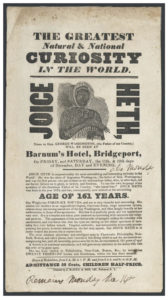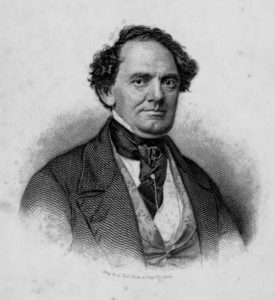Slider photo by Jared Schultz
The 2017 film, “The Greatest Showman,” directed by Michael Gracey, tells the inspiring story of Phineas Taylor Barnum, founder of Barnum’s American Museum, which would later evolve into the world famous Barnum and Bailey Circus. Barnum, played by Hugh Jackman, is portrayed as an impoverished man who followed his dreams and built his business out of nothing but willpower and wit. In a time corrupted by bigotry, Barnum is shown as the man who stood up for those cast out of society. This captivating musical brings joy to people of all ages and leaves viewers with a powerful message of compassion and equality. But there is a lot more to this story than meets the eye.
Born in 1810, Barnum learned early on that he had a natural ability to sell and capture the public’s attention. By the age of 12, he was selling snacks and rum to soldiers. In 1835, Barnum purchased Joice Heth, an African-American slave, for $1,000 and put her on exhibition. He claimed that she was the maid of George Washington, making her well over 100 years old, and racked in over $1,500 dollars a week from curious spectators. After Heth died, Barnum held a public autopsy with an admission fee of 50 cents, during which it was revealed that she had died at around the age of 80.

Barnum was notorious for fabricating elaborate hoaxes to bring people into his museum. One of his most famous concoctions was the “Feejee Mermaid.” Originating from Asia, this grotesk specimen was supposedly the mummified remains of a real mermaid. In reality, it was nothing more than the upper body of a young ape sewn onto the bottom half of a fish, most likely a salmon.
What made Barnum unique was his ability to put on a good show. He did not expect everyone to believe in his outrageous claims. Rather, Barnum capitalized on the public’s curiosity, and showed the people of the world the peculiar, taboo, and unnatural curiosities that they never knew they wanted to see. In his own words, Barnum said, “As a general thing, I have not ‘duped the world’ nor attempted to do so…I have generally given people the worth of their money twice told.”
In addition to his role in entertainment, Barnum also pursued a career in politics later in his life. He served in the Conn. legislature, and later as the governor of Bridgeport. Interestingly, he publicly condemned slavery, and spoke before the state legislature during the ratification process of the Thirteenth Amendment, in spite of the fact that his great success as a showman had been kickstarted by featuring a slave.

Barnum faced much controversy for his hoaxes and forgeries, as well as a rumored affair with the star of one of his most successful performances, Jenny Lind. Lind was a renowned Swedish opera singer. She went on tour with Barnum around the United States, which appealed to a more aristocratic crowd, the type of people who would generally dismiss his his museum.
However, halfway through the tour, Lind quit for reasons unbeknownst to the general public. It was assumed by many that this was due to an affair with Barnum, which becomes a major plot point in the film. In reality, this rumour was false. The real reason Lind quit was due to the stress of being on tour; she just got tired of life on the road.
Overall, P.T. Barnum was a complex man, who lived a complex life. He could entertain an audience, no matter the event, and he truly lived up to the title “Greatest Showman.” Barnum received much publicity, both good and bad, for his outrageous antics, but he didn’t care, “so long as they spelled his name right.”















































































